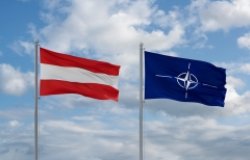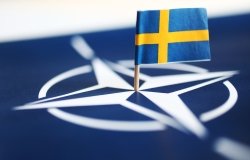A Cyprus Settlement in 2004? Policy Implications for Turkey, NATO and the EU
Conference on "A Cyprus Settlement in 2004? Policy Implications for Turkey, NATO and the EU". Generous support for this event provided by Gilford Corporation, Portland State University, Euclid Financial Group, PanCyprians of Metropolitan Washington and private individuals.
Overview
Executive Summary
Summary of Conference Remarks
by Susan M. Spencer
Writer and Sr. Editor, Western Policy Center
Remarks by John Sitilides, Executive Director, Western Policy Center
Remarks by Matthew Bryza, Director for Europe and Eurasia, National Security Council
Topic: "The American Perspective"
Mr. Bryza?s remarks were off the record.
PANEL I: THE SECURITY DIMENSION
Moderator: Amb. James Williams, Former U.S. Special Coordinator for Cyprus
Panelists:
Col. Stephen Norton, U.S. Army, Ret., Senior Policy Advisor, Western Policy Center
Topic: "Securing the Peace"
Col. David Fetter, U.S. Army, Ret., Instructor, Defense Attaché School, Department of Defense
Topic: "Psychological Security"
The "psychological security" of the Turkish Cypriots, or what they perceive gives them security, rests totally on the presence of the Turkish military in the north. The Turkish Cypriot Security Force is under the command of the Turkish Army. The Turkish officers deployed in Cyprus are in a high state of readiness, having been on duty in Turkey?s southeast. If the Turkish troops withdraw from Cyprus, the U.N. peacekeeping force (UNFICYP) will do little to give the Turkish Cypriots a feeling of security. Denktash has said he wants Turkish forces to remain in Cyprus permanently.
The psychological security of the Greek Cypriots stems from recognition of the government of the Republic of Cyprus as the only internationally recognized administration on the island, from Cyprus?s pending membership in the European Union, from the presence of UNFICYP in the buffer zone, and from the strong Greek Cypriot economy and the affluence in the south, stemming from shipping and other enterprises. The Greek Cypriots do not view their military as part of the framework for this psychological security, though Cyprus?s defense pact with Greece does play a role.
The challenge in the search for a Cyprus settlement is to convince all parties that security measures are in place in the country and that ethnic conflict will not be tolerated by the international community.
Lt. Col. Peter Najera, Country Director for Greece and Cyprus, Office of the Secretary of Defense
Topic: "A Cyprus Settlement: Unlocking the Potential of the Aegean"
In military circles, the Cyprus problem is seen as the last major source of tension in the Aegean. A settlement in Cyprus will open the floodgates for cooperation among the nations of the region in NATO, the United Nations, and the U.S.-led global war on terrorism.
NATO is transforming itself to look "outward," as the nature of warfare changes. A Cyprus settlement will promote this trend, will lead to greater cooperation in establishing a security architecture for the Black Sea region, and will promote peacekeeping ventures in the Caucasus and Central Asia. It will free Greek, Turkish, and U.N. forces now on the ground in Cyprus for deployment in U.N., EU, and NATO forces.
In addition, a Cyprus settlement will help change the "mental mindset" in the Turkish and Greek militaries, leading them to develop a new strategy for the region and for Europe, while also making them stronger U.S. allies. A significant move by Greece and Turkey has been their joint commitment to remove the land mines along their northern border. This is a skill needed worldwide as terrorists choose mines as their weapon of choice.
Larry Chalmer, Director of the NATO Staff Officer Orientation Course, National Defense University
Topic: "50 Plus: Adjusting NATO?s Lenses"
NATO has changed since it was established in 1949. Its member nations must continue to adjust their "vision" as the alliance enters middle age. In its early stages, the alliance was occupied with issues such as the cold war, fragile economies, and concerns regarding Russia. Today, NATO is focused on Afghanistan, Iraq, Bosnia, Kosovo, and the war on terrorism. NATO does not view Cyprus as a "hot" issue.
There are fiscal realities that must be dealt with. The European Union is a major economic force in need of markets, which can be provided by Turkey and Cyprus. Full EU membership for Turkey would open up a huge new market for the EU.
The Greek and Turkish forces in Cyprus could be deployed in the NATO Response Force if there is a settlement.
Remarks, Amb. Thomas Weston, U.S. Special Coordinator for Cyprus
Topic: "The Current State of U.N. Negotiations"
During the February 10-13 meetings in New York, where a timeline for achieving a Cyprus settlement was agreed upon, there was significant compromise and movement by all four parties involved, for which they deserve great credit. The Turkish side deserves particular credit for coming up with an initiative to move the process forward.
What was different from the March 2003 negotiations in The Hague, which collapsed, was determining how the settlement would be finalized. It was agreed that Greece and Turkey would join the negotiations on March 22 if the Greek Cypriot and Turkish Cypriot sides had failed to iron out their differences. It was also agreed that, if no settlement emerged by March 29, U.N. Secretary General Kofi Annan would use his discretion to resolve the differences without any additional negotiations and would produce a final text by March 31, which would be put to referendums.
Another important accomplishment during the New York talks was the decision to establish a fourth technical committee to handle economic and financial issues, which have not been dealt with as thoroughly as they should have been in the Annan plan. The other three committees, which already existed, are handling legislation, treaties, and issues such as the new flag, national anthem, Supreme Court justices, and Central Bank matters. The Greek Cypriots and Turkish Cypriots on the committees are committed to achieving results.
The chances of a Cyprus settlement have risen with this new negotiating framework in place, but it is not certain that the referendums will pass. They will pass if they are supported by the political leaders, which will depend on what is in the settlement. There are also concerns regarding the financing of a settlement. The international community should be supportive of these financing needs so the two sides can take that into account when voting on the referendums.
Remarks, Jonathan Davidson, Senior Advisor for Political and Academic Affairs, European Commission Delegation, Washington, D.C.
Topic: "The EU Perspective"
(See prepared remarks.)
The European Council will decide in December 2004 if Turkey is to begin EU accession talks. Its decision will be based on a European Commission report concerning whether Turkey has met the political criteria for accession. The EU is working closely with Turkey through a cooperative process to help it achieve the necessary reforms.
If Turkey eventually becomes an EU member, it will make a valuable contribution to the increasingly diverse fabric of the European Union. Turkey combines rich elements of European and Islamic history and culture with the aspirations of a young and modern nation seeking to anchor itself firmly in the West as a pluralistic democracy and vibrant market economy.
Although the accession of Cyprus to the EU is a certainty, the question is whether all of Cyprus will benefit from this accession. Legally, all of Cyprus will join the bloc, but the implementation of the acquis communautaire, the body of EU laws, will be suspended in the north pending a settlement. The EU has always made clear its preference for a united Cyprus joining the EU, but has never made it a precondition for membership. The EU has a strong interest in avoiding the importation of territorial disputes into the bloc.
The EU is not a party to the Cyprus negotiations, but there are EU representatives on the ground in Cyprus to provide advice on the technical and legal aspects of a settlement. The European Commission has also said that it would host a donor?s conference for Cyprus. It will also convene a pre-conference before the referendums are held to ensure that financing is available to implement a settlement. In 2003, the EU implemented a package of financial aid and trade initiatives to bring the two sides in Cyprus together. Turkey is already benefiting from many European Union programs as an EU candidate, including $310 million in aid this year, increasing to $621 million in 2006.
PANEL II: THE POLITICAL DIMENSION
Moderator: Amb. Donald Bandler, former U.S. Ambassador to Cyprus
Panelists:
Amb. Andrew Jacovides, former Cyprus Ambassador to the United States
Topic: "Cyprus: Prospects for a Solution?"
(See prepared remarks.)
A few weeks ago, it appeared as if Cyprus would accede to the European Union on May 1 without a settlement. The February 13 decision in New York by all parties involved in the Cyprus issue to agree to a negotiation timetable ending with the April 21 referendums has radically transformed the situation in Cyprus. With pressure applied by the United Nations, the United States, and the European Union, it is assumed that both sides will vote "yes" on the referendums.
But how will public opinion evolve concerning the Annan plan, a complicated document, in Turkey, Greece, and Cyprus? Will the provisions of the plan be functional? Historical suspicions in Cyprus cannot be overcome easily.
The financial burden of implementing the plan, particularly on the Greek Cypriot sector, will be considerable. For example, the plan obligates the Greek Cypriots to compensate Turkish Cypriots for their properties in the south. The Turkish side, on the other hand, is not obligated to pay anything to compensate Greek Cypriots for their properties in northern Cyprus. The economic aspects of the Annan plan will cost $36 billion. Cyprus?s entry into the euro-zone is now scheduled for 2007. The economic burden of the plan will move this date farther into the future. With its current financial commitments globally, Washington cannot be expected to give Cyprus more than a few hundred million dollars. Donor fatigue is a real possibility.
From the international legal point of view, the Annan plan is flawed. The role of the guarantor powers is not clarified. Access by owners to their properties, as in the case of Greek Cypriot Titina Loizidou, has not been addressed.
The outcome of the April 21 referendums is by no means assured. Most people believe that the Annan plan, even though they are not satisfied with it, is the last chance to avoid partition in Cyprus. They also believe that, through EU membership, decisions made in Brussels will be beneficial for Cyprus. There are others, however, who consider the Annan plan to be unfair and feel that it was created in pursuit of foreign interests. They see a type of Bosnia and Herzegovina emerging, with the Greek Cypriots subsidizing the Turkish Cypriot economy.
Dr. Omer Taspinar, Co-Director of the Turkey Program, Brookings Institution
Topic: "Domestic Determinants of Turkey?s Cyprus Policy"
What has changed in Turkey that would cause it to promote a Cyprus settlement at this time? Resolving the Cyprus problem is a "strategy of survival" for Turkey?s ruling Justice and Development Party (AKP). The party?s future depends on whether Turkey can open accession talks with the European Union in 2005, with a Cyprus settlement being an important component of that goal.
The AKP learned a lesson from the Kemalist backlash against the Welfare Party leading to the resignation of Prime Minister Necmettin Erbakan in 1997, and it is a product of that process. The AKP realized that, by supporting EU accession, it would achieve a better democracy, with less military influence on the political system, which is a major concern of the party. The military cannot oppose liberal democratic reforms carried out in the name of joining the EU. Some say that the AKP is using this process as a pretense to undermine the military. The opposition party, the Republican People?s Party (CHP), is very weak and is shrinking in the polls, leaving the AKP and the military as the primary influences.
The Kemalist movement questions why the AKP, with its Islamist roots, wants Turkey to join the European Union. The desire of the Islamists to join the EU has made the Kemalists increasingly confused about Turkey?s EU aspirations. The Kemalist establishment believes that the AKP will push forward an Islamist agenda if the EU does not set a date for Turkey?s accession talks.
Dr. Harry Anastasiou and Dr. Birol Yesilada, Portland State University
Topic: "Solving the Cyprus Problem Before May 2004: Opportunities and Challenges"
(See presentation.)
Dr. Anastasiou, Associate Professor for Conflict Resolution and International Studies, and Dr. Yesilada, Professor of Political Science and International Studies, jointly presented the results of a study they launched in 1997, along with three other scholars. The study involved identifying the five major factors at the core of the Cyprus problem and interviewing the actors involved in the problem to see where they stood on all five issues. The study is entitled "The Cyprus Problem and Prospects for a Settlement."
The issues are the shape of the future political system in Cyprus, guarantorship, the freedoms of movement, settlement, and property rights, territorial adjustment, and the link between Turkey?s accession to the EU and the Cyprus problem. The players interviewed included Greek, Turkish, Turkish Cypriot, and Greek Cypriot leaders, political party representatives, labor union members, military officers, and church representatives, as well as officials in the United States, Britain, the European Union, and the United Nations, which are all playing a role in promoting a Cyprus settlement.
The study concluded that what is possible with respect to reaching a settlement, based on the positions presented by those interviewed, is very close to the elements in the Annan plan.
The scholars identified the new parameters that have re-framed the Cyprus problem: the rise of the role of civil society -- the citizens? peace movement -- among the Greek Cypriots and Turkish Cypriots, Greek-Turkish rapprochement beginning in 1999, the path of Cyprus toward EU accession with the potential for Greek Cypriots and Turkish Cypriots to come together under one institutional framework, and U.S. diplomatic involvement in the Cyprus problem in view of Washington?s new global challenges.
Dr. Anastasiou, of Greek Cypriot background, and Dr. Yesilada, of Turkish Cypriot background, teach at Portland State University within the framework of a "Peace Initiatives Project," focusing on Cyprus, Greece, and Turkey. The project was launched in May 2002 in the buffer zone in Cyprus during a bicommunal gathering attended by Turkish Cypriots and Greek Cypriots engaged in peace-building activities.
Hosted By

Global Europe Program
The Global Europe Program is focused on Europe’s capabilities, and how it engages on critical global issues. We investigate European approaches to critical global issues. We examine Europe’s relations with Russia and Eurasia, China and the Indo-Pacific, the Middle East and Africa. Our initiatives include “Ukraine in Europe” – an examination of what it will take to make Ukraine’s European future a reality. But we also examine the role of NATO, the European Union and the OSCE, Europe’s energy security, transatlantic trade disputes, and challenges to democracy. The Global Europe Program’s staff, scholars-in-residence, and Global Fellows participate in seminars, policy study groups, and international conferences to provide analytical recommendations to policy makers and the media. Read more
Thank you for your interest in this event. Please send any feedback or questions to our Events staff.










